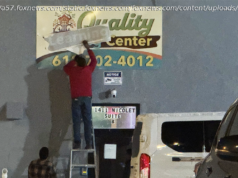People laughed when Mayor Mike Duggan first predicted that Detroit could emerge from active state oversight this spring. On Monday, it happened.
For the first time in years, Detroit is in charge of its own budget. A Michigan commission assigned to oversee the city’s financial decisions voted on Monday to end its day-to-day control.
The vote was a nod to Detroit’s improved fiscal shape and a string of balanced annual budgets following its slide into bankruptcy five years ago. Other signs of the renewal that has been taking place for several years can be found on the streets, which we visited last week.
We asked Mayor Mike Duggan, who was first elected in 2013 in the middle of the city’s financial crisis, what this moment means. The interview has been edited and condensed.
Why does an end to active state oversight matter?
For as long as I can remember, you had various city agencies under judicial or federal or state oversight or receivership. This is the first time in my memory that the city of Detroit and all its agencies have had full self determination.
During the bankruptcy, how quickly did state officials think Detroit would be back to handling its finances on its own?
I said I expected us to be out of state oversight by the spring of 2018 — and everybody laughed. It just seemed, given where Detroit was at the time, kind of a long-shot.
Is Detroit ready?
We are. If you were with me in community meetings, you’d see where people come and say: ‘You need to reopen more recreation centers.’ And I say, ‘Look, this city ended up in financial crisis because its elected officials didn’t have the courage to say to you that with the revenue we have, we can’t afford to do that. I’m not going to allow us to get to the point where anybody from the outside ever takes over again. So I’m just going to tell you truth: We can’t afford to do that right now.’ And inevitably there a huge round of applause from the crowd. People in this city just want to be told the truth.
As revenues grow, Detroit is bringing basic services like street sweeping back. How’s that going?
The first time, we put up signs saying ‘Please remove your cars for the street sweeper,’ and people thought it was a joke. They didn’t move their cars. The second and third time, people said, ‘Oh my God, they’re really sweeping streets.’ It may seem like a small thing to you but for people in this city who are thinking, ‘I’m getting tired of living here, maybe I’ll move out,’ that street sweeper coming down the street says the quality of life is really being restored.
So, does this mean everything is great in Detroit now?
Each year we have moved the needle in a positive direction and you can just see it. We have a six month wait list now to get an apartment in Midtown. But we’ve got a long way to go. Other cities have had a big advantage on us. We’re up for it.
If you could magically one thing about the city right now, what would it be?
The violence. That’s a huge part of our focus — to keep driving down the rate of violence.
When Detroit filed for bankruptcy, lots of experts said it was a risky move that would forever tarnish the city’s image and financial standing. But does Detroit’s experience make an argument in favor of struggling cities going bankrupt?
The bankruptcy certainly gave us a restructured balance sheet that gave us money to deliver more services. But it was a traumatic experience for the people who lived here. I wouldn’t recommend it to anybody.






